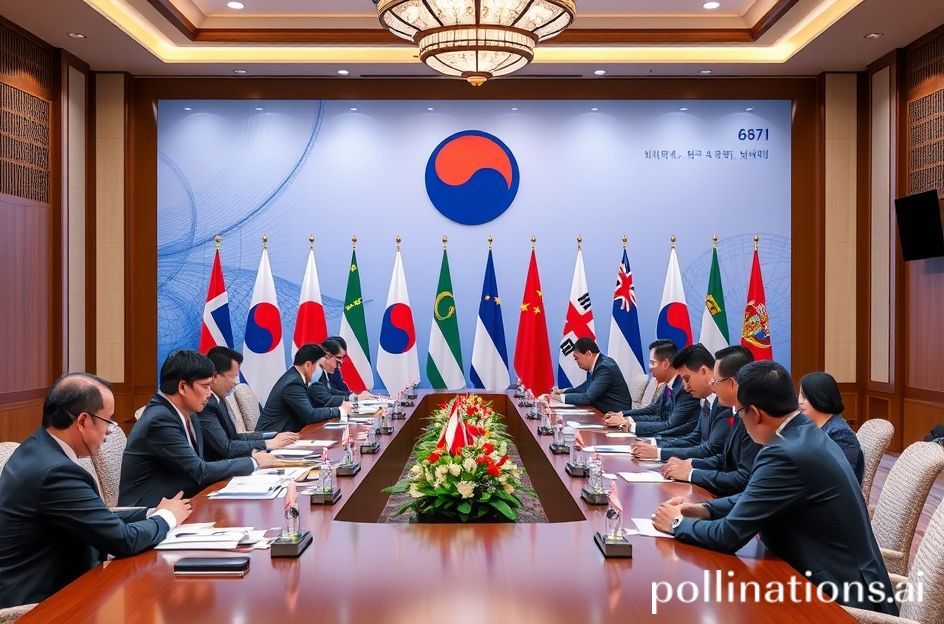Seoul Security Dialogue 2025: South Korea to Host 1,000 Global Experts in Landmark AI Security Summit

South Korea is positioning itself as a major player in global security discourse by hosting the Seoul Security Dialogue 2025, scheduled for November 2025. The ambitious three-day summit will bring together 1,000 security experts and policymakers from 68 countries to address one of the most pressing issues of our time: artificial intelligence's transformative impact on national security and warfare.
Strategic Positioning in Global Security Architecture
For American readers unfamiliar with South Korea's evolving diplomatic role, this summit represents a significant shift from the country's traditional position as a security consumer to becoming a security agenda-setter. Unlike traditional security conferences that focus on conventional military threats, Seoul's initiative specifically targets the intersection of cutting-edge technology and national security—a domain where few countries have both the technological expertise and strategic motivation to lead.
The conference's focus on AI and emerging technologies reflects South Korea's unique position in the global tech ecosystem. As home to tech giants like Samsung and LG, plus a thriving startup ecosystem, South Korea possesses the technological credibility to convene meaningful discussions about AI's security implications. This is comparable to how Silicon Valley companies influence American tech policy, but at a national scale.
The timing is particularly strategic. As the United States and China engage in technological competition, middle powers like South Korea are carving out influential roles by focusing on specific expertise areas. The Seoul Security Dialogue positions South Korea as a bridge between technological innovation and security policy—similar to how Singapore has positioned itself as a financial hub or how Switzerland hosts diplomatic summits.
AI Security Challenges and International Cooperation
The summit's agenda addresses five critical areas that resonate strongly with American security concerns: autonomous weapons systems, cybersecurity vulnerabilities, information warfare capabilities, ethical military AI deployment, and the need for international technological governance frameworks. These issues have become increasingly prominent in U.S. defense policy discussions, particularly following recent developments in AI-powered military technologies.
For context, imagine if the Pentagon's Defense Advanced Research Projects Agency (DARPA) were to host an international summit on military AI—the Seoul Security Dialogue represents a similar initiative but from a middle-power perspective that emphasizes multilateral cooperation over great power competition. This approach allows for more inclusive dialogue about establishing international norms and standards.
The conference structure includes dedicated sessions on cybersecurity threats, regional security cooperation, and future battlefield environments. These topics directly parallel ongoing discussions in U.S. defense circles about hybrid warfare, Space Force operations, and cyber command strategies. However, South Korea's approach emphasizes collaborative norm-setting rather than competitive advantage-seeking.
The participation of experts from 68 countries suggests an ambitious scope that extends beyond traditional alliance partnerships. This inclusive approach differs from more exclusive forums like the G7 or NATO summits, potentially creating new pathways for international security cooperation that don't rely solely on formal alliance structures.
Implications for U.S.-South Korea Security Partnership
This initiative reflects South Korea's growing confidence in its role as a security partner rather than just a security beneficiary. For American policymakers accustomed to South Korea's traditional focus on North Korean threats, this expansion into global security leadership represents a maturing alliance relationship. It suggests South Korea is ready to contribute to broader U.S. security interests in the Indo-Pacific region and beyond.
The emphasis on AI security also aligns with U.S. strategic priorities outlined in recent National Security Strategy documents. By hosting this dialogue, South Korea is effectively offering to be a testing ground for AI governance frameworks that could later be adopted by larger powers. This mirrors how small countries often serve as regulatory laboratories for financial or environmental policies that later scale globally.
From a strategic perspective, South Korea's initiative could complement existing U.S.-led security frameworks like the Quad (U.S., Japan, Australia, India) or AUKUS (Australia, United Kingdom, U.S.) by providing a multilateral platform specifically focused on technological security challenges. This could help address concerns that U.S.-led initiatives are too exclusive or competitive in nature.
The November 2025 timing also positions the summit to influence global security discourse ahead of the 2026 U.S. midterm elections and the 2028 presidential election, potentially shaping how American voters think about international cooperation on emerging security challenges.
Long-term Significance and Global Impact
The Seoul Security Dialogue represents more than just another international conference—it signals the emergence of technology-focused security diplomacy as a distinct field. For American businesses and policymakers, this creates new opportunities for international cooperation on AI governance, cybersecurity standards, and technology export controls.
The summit's success could establish Seoul as a permanent fixture in global security calendar, similar to how the Munich Security Conference or the Shangri-La Dialogue have become annual focal points for international security discussions. This would give South Korea sustained influence over global security discourse, particularly on technology-related issues.
Moreover, the initiative demonstrates how middle powers can effectively shape international agendas by leveraging their specific strengths—in this case, South Korea's combination of technological capability and strategic location. This model could inspire other technologically advanced countries to take leadership roles in their areas of expertise, potentially creating a more distributed and collaborative approach to global security governance.
For the United States, supporting this initiative represents an opportunity to demonstrate commitment to multilateral approaches to security challenges while benefiting from South Korea's technological expertise and convening power. The summit's outcomes could provide valuable inputs for U.S. policy development on AI governance and international technology security cooperation.
Source: Original Korean article
Original Korean Article: https://trendy.storydot.kr/seoul-security-dialogue-2025-sep10-2nd/


0 Comments